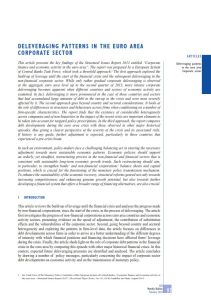Join getAbstract to access the summary!

Join getAbstract to access the summary!
European Central Bank
Deleveraging Patterns in the Euro Area Corporate Sector
ECB, 2014
What's inside?
Euro-zone banks grab the headlines, while nonfinancial firms are quietly deleveraging.
Recommendation
Coming back from the recent recession has been a long, hard slog for many developed economies, particularly Europe’s. Deliberations at the European Central Bank’s headquarters in Frankfurt center on why meager growth persists in the euro zone and how to move beyond it. Given the power and influence of these central bankers, understanding what they are thinking is more important than ever. getAbstract recommends this scholarly but accessible analysis of corporate debt and deleveraging in the EU to executives, bankers, analysts and investors.
Summary
About the Author
The European Central Bank is the monetary authority of the euro zone.






















Comment on this summary